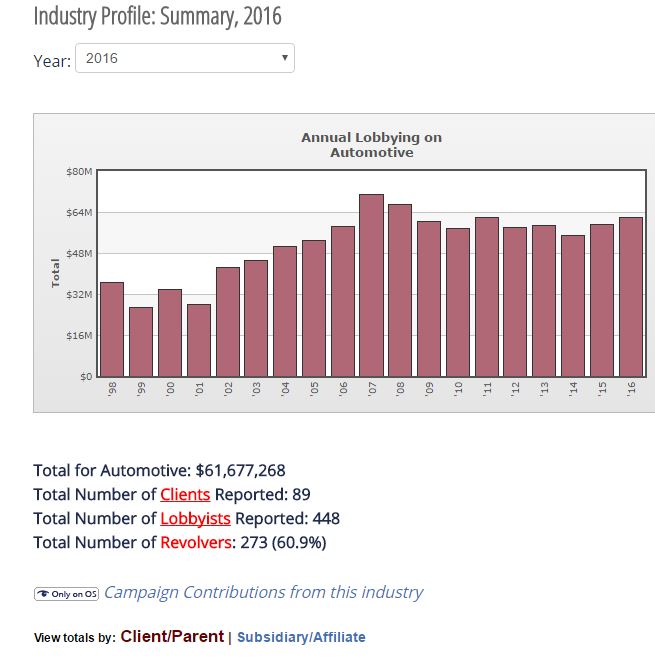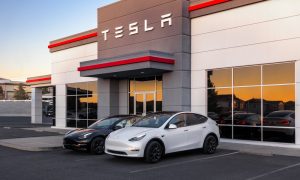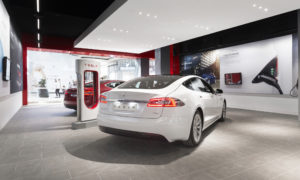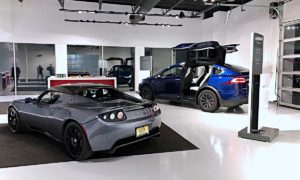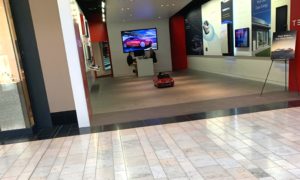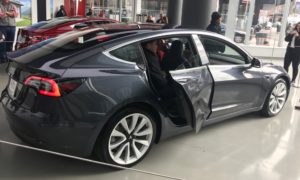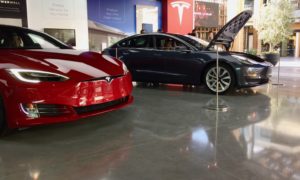News
Indiana is back with another bill to ban Tesla’s direct sales model
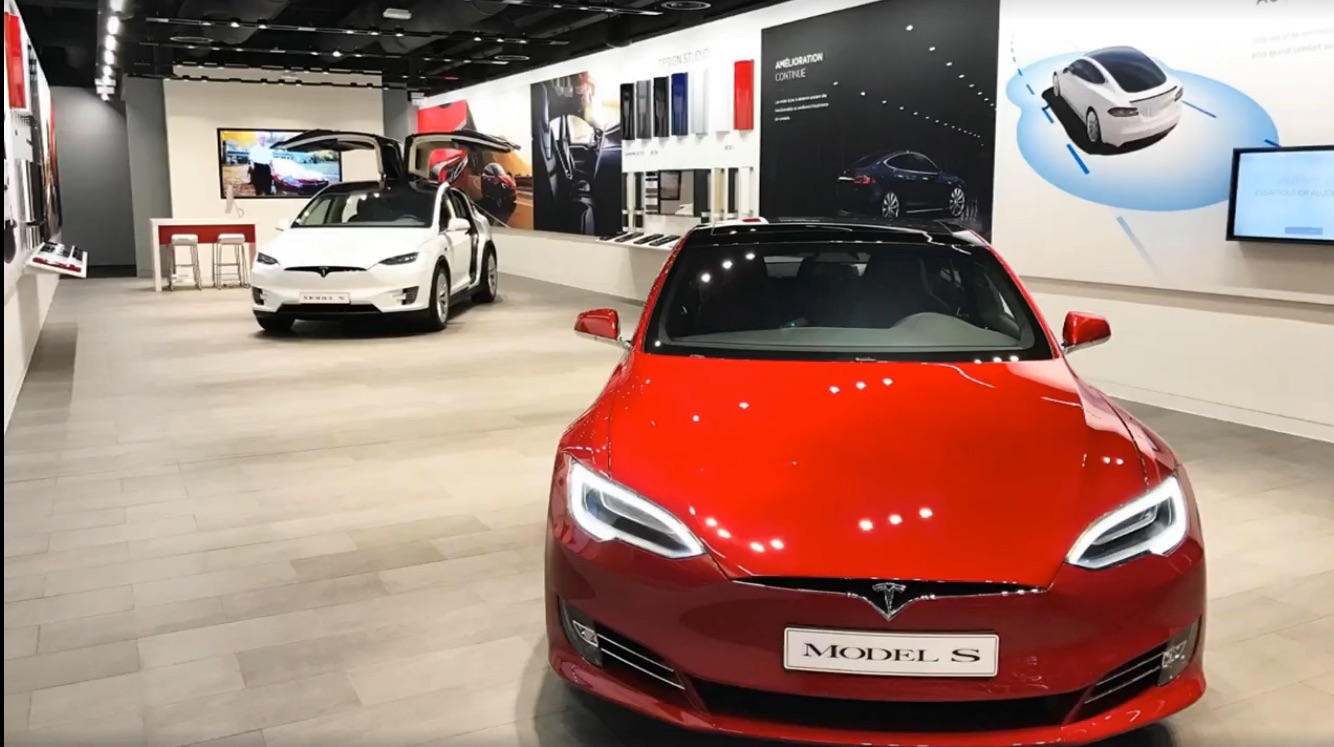
If a proposed Indiana House bill is passed, manufacturers of “all-electric vehicles” would be banned from selling directly to consumers. The bill does not direct any specific language to Tesla Motors, Inc., but the innovative vehicle manufacturer is clearly the target of the legislation. Add Indiana into the mix of Tesla’s long list of court cases pending in which car dealers and automakers claim that they, as intermediaries, have sole right to sell vehicles to consumers.
Indiana House Bill 1592
Indiana automakers have traditionally used an established network of dealers who negotiate with buyers and provide automotive repair services. These automakers are part of a large umbrella of politically influential groups. They argue that Tesla’s model allows the company to evade laws, which confers an unfair advantage to Tesla and provides no accountability to its buyers.
Here is the synopsis of the Indiana House Bill 1592.
Automobile sales requirements. Provides that a manufacturer may engage in sales directly to the public only if the manufacturer meets certain requirements. Provides that a manufacturer can no longer engage in sales directly to the public after the earlier of: (1) reaching 1,000 units in cumulative annual sales; or (2) six years after the initial dealer’s license is granted.
Additionally, Sec. 20. of the bill reads:
A manufacturer licensed under this article may engage in sales directly to the general public only if the manufacturer (1) has exclusively offered for sale to the general public in Indiana all-electric vehicles on a continuous basis since July 15, 2015; (2) has never offered for sale to the general public in Indiana a line make of new motor vehicles through a franchised motor vehicle dealer.
Tesla is the only vehicle manufacturer which meets these particular criteria. Tesla sells its electric vehicles directly to consumers, while other manufacturers like General Motors, Ford, Subaru, and Toyota sell through Indiana dealerships. If passed, the bill would severely limit Tesla’s ability as a manufacturer to sell to the public:
Subject to the expiration schedule under IC 9-32-11-12.5, a manufacturer can no longer sell to the public after the earlier of the following: (1) A manufacturer described in this section reaches cumulative annual sales of one thousand (1,000) units to the general public from its licensed location in Indiana.
The author of the bill, Rep. Edmond Soliday, a Republican, has authored or co-authored several transportation bills, including transportation infrastructure funding, automated traffic enforcement, vehicle excise taxes, and department of transportation property matters. He defeated Midwest Environmental Systems CEO Pamela Fish in the November, 2016 elections. House Bill 1592 will be heard by the Roads and Transportation committee.
Last year another Republican, Rep. Kevin Mahan, supported a similar bill that would have forced manufacturers to sell their vehicles through a dealership. “For the average Hoosier, purchasing an automobile can be daunting and a big investment,” Mahan said. “A greater variety of vehicles are now available and can be brought directly to consumers virtually anywhere in the country. In the event of a recall or malfunction, consumers should be protected.”
Arguments against limiting manufacturer sales
Tesla Motors, Inc.’s Vice President of Corporate and Business Development Diarmuid O’Connell testified against House Bill 1592. “Tesla does not operate through some kind of loophole in Indiana law,” O’Connell said. “The current law is explicit in Tesla’s ability to sell directly and, as written today, it is not broken.” O’Connell’s remarks point to current Indiana law in which an auto manufacturer is not allowed to open a store in direct competition with an affiliated franchised dealer. Tesla has no direct competition franchise dealers in Indiana and has always sold directly to consumers. O’Connell added that Tesla’s presence in Indiana has “brought only good to the consumer welfare without harming anyone — not even the dealers.”
At stake is more than a corporate tug-of-war between automakers. Tesla’s electric vehicles are at the heart of that vision for tomorrow’s consumer domestic transportation and will continue to flourish and change the way automakers in the U.S. and abroad have conducted business as usual.
If “you’re interested in promoting competition and free market principles … you recognize direct distribution, particularly for a company like Tesla, is critically important,” said Todd Maron, the company’s chief counsel, during remarks at a 2016 Federal Trade Commission event. “We don’t simply believe that [electric vehicles] represent a nice complement to gas powered cars. We believe that it’s imperative that they are replaced entirely by electric vehicles.” An end to franchising laws would advance that goal and place low-mileage gas-powered vehicles at risk of obsolescence.
Arguments in favor of limiting manufacturer sales
A coalition of free market groups, led by Americans for Tax Reform President Grover Norquist, argues that ending or restricting automotive franchising would actually decrease consumer choice. Norquist believes that reducing competition among dealers selling the same car brands hurts consumers. Franchising laws were actually created by anti-trust efforts at the Federal Trade Commission and “they sustain market competition rather than undermine it.” Last year, the group accused federal regulators of ignoring evidence that would undermine proposed measures governing automotive sales that stand to enrich what they saw as a “politically-powerful company” at consumers’ expense.
Harry Tepe, owner of Tom Tepe Auto Center in Milan, Indiana, supports legislation that would further protect consumers in the auto industry. “We just want to make sure there are protections in place for the consumers,” Tepe said. “The issue at hand is that the loophole is still open that allows any manufacturer to come in and market a vehicle and sell directly to the public without having any protections in place for the consumer.” He takes the position that dealerships are responsible for being a liaison between the consumer and the manufacturer.
Lobbying on behalf of the automotive industry
Proponents and opponents of Indiana House Bill 1592 are, in many cases, influenced by a powerful automotive lobby in the U.S. Automotive industry lobbyists use a combination of strategies to gain influence. They do a lot of research, sit down with lawmakers one-on-one, deliver messages in writing, and call Congressmen and members of the administration on the phone.
“If you’re a big company, like a carmaker, and you’re lobbying lawmakers, you’re almost like a pro sports team. You want to get the big names, the most talented, most knowledgeable people,” said David Levinthal, communications director for the Center for Responsive Politics, a non-partisan research group that tracks the money spent in the U.S. political system and its effect on elections and public policy. “So, these big companies, in the major industries, hire former Congressmen and top Congressional staffers and other high-ranking government officials to be their lobbyists, because those are the folks who know who all the other major players are and they know the ways of Washington.”
Elon Musk
Tesla Supercharger Diner food menu gets a sneak peek as construction closes out
What are you ordering at the Tesla Diner?

The Tesla Supercharger Diner in Los Angeles is nearing completion as construction appears to be winding down significantly. However, the more minor details, such as what the company will serve at its 50s-style diner for food, are starting to be revealed.
Tesla’s Supercharger Diner is set to open soon, seven years after CEO Elon Musk first drafted the idea in a post on X in 2018. Musk has largely come through on most of what he envisioned for the project: the diner, the massive movie screens, and the intended vibe are all present, thanks to the aerial and ground footage shared on social media.
We already know the Diner will be open 24/7, based on decals placed on the front door of the restaurant that were shared earlier this week. We assume that Tesla Optimus will come into play for these long and uninterrupted hours.
The Tesla Diner is basically finished—here’s what it looks like
As far as the food, Tesla does have an email also printed on the front door of the Diner, but we did not receive any response back (yet) about what cuisine it will be offering. We figured it would be nothing fancy and it would be typical diner staples: burgers, fries, wings, milkshakes, etc.
According to pictures taken by @Tesla_lighting_, which were shared by Not a Tesla App, the food will be just that: quick and affordable meals that diners do well. It’s nothing crazy, just typical staples you’d find at any diner, just with a Tesla twist:
Tesla Diner food:
• Burgers
• Fries
• Chicken Wings
• Hot Dogs
• Hand-spun milkshakes
• And more https://t.co/kzFf20YZQq pic.twitter.com/aRv02TzouY— Sawyer Merritt (@SawyerMerritt) July 17, 2025
As the food menu is finalized, we will be sure to share any details Tesla provides, including a full list of what will be served and its prices.
Additionally, the entire property appears to be nearing its final construction stages, and it seems it may even be nearing completion. The movie screens are already up and showing videos of things like SpaceX launches.
There are many cars already using the Superchargers at the restaurant, and employees inside the facility look to be putting the finishing touches on the interior.
🚨 Boots on the ground at the Tesla Diner:
— TESLARATI (@Teslarati) July 17, 2025
It’s almost reminiscent of a Tesla version of a Buc-ee’s, a southern staple convenience store that offers much more than a traditional gas station. Of course, Tesla’s version is futuristic and more catered to the company’s image, but the idea is the same.
It’s a one-stop shop for anything you’d need to recharge as a Tesla owner. Los Angeles building permits have not yet revealed the date for the restaurant’s initial operation, but Tesla may have its eye on a target date that will likely be announced during next week’s Earnings Call.
News
Tesla’s longer Model Y did not scale back requests for this vehicle type from fans
Tesla fans are happy with the new Model Y, but they’re still vocal about the need for something else.

Tesla launched a slightly longer version of the Model Y all-electric crossover in China, and with it being extremely likely that the vehicle will make its way to other markets, including the United States, fans are still looking for something more.
The new Model Y L in China boasts a slightly larger wheelbase than its original version, giving slightly more interior room with a sixth seat, thanks to a third row.
Tesla exec hints at useful and potentially killer Model Y L feature
Tesla has said throughout the past year that it would focus on developing its affordable, compact models, which were set to begin production in the first half of the year. The company has not indicated whether it met that timeline or not, but many are hoping to see unveilings of those designs potentially during the Q3 earnings call.
However, the modifications to the Model Y, which have not yet been officially announced for any markets outside of China, still don’t seem to be what owners and fans are looking forward to. Instead, they are hoping for something larger.
A few months ago, I reported on the overall consensus within the Tesla community that the company needs a full-size SUV, minivan, or even a cargo van that would be ideal for camping or business use.
Tesla is missing one type of vehicle in its lineup and fans want it fast
That mentality still seems very present amongst fans and owners, who state that a full-size SUV with enough seating for a larger family, more capability in terms of cargo space for camping or business operation, and something to compete with gas cars like the Chevrolet Tahoe, Ford Expedition, or electric ones like the Volkswagen ID.BUZZ.
We asked the question on X, and Tesla fans were nearly unanimously in support of a larger SUV or minivan-type vehicle for the company’s lineup:
🚨 More and more people are *still* saying that, despite this new, longer Model Y, Tesla still needs a true three-row SUV
Do you agree? https://t.co/QmbRDcCE08 pic.twitter.com/p6m5zB4sDZ
— TESLARATI (@Teslarati) July 16, 2025
Here’s what some of the respondents said:
100% agree, we need a larger vehicle.
Our model Y is quickly getting too small for our family of 5 as the kids grow. A slightly longer Y with an extra seat is nice but it’s not enough if you’re looking to take it on road trips/vacations/ kids sports gear etc.
Unfortunately we…
— Anthony Hunter (@_LiarsDice_) July 17, 2025
Had to buy a Kia Carnival Hybrid because Tesla doesn’t have a true 3 row vehicle with proper space and respectable range. pic.twitter.com/pzwFyHU8Gi
— Neil, like the astronaut (@Neileeyo) July 17, 2025
Agreed! I’m not sure who created this but I liked it enough to save it. pic.twitter.com/Sof5nMehjS
— 🦉Wise Words of Wisdom – Inspirational Quotes (IQ) (@WiseWordsIQ) July 16, 2025
Tesla is certainly aware that many of its owners would like the company to develop something larger that competes with the large SUVs on the market.
However, it has not stated that anything like that is in the current plans for future vehicles, as it has made a concerted effort to develop Robotaxi alongside the affordable, compact models that it claims are in development.
It has already unveiled the Robovan, a people-mover that can seat up to 20 passengers in a lounge-like interior.
The Robovan will be completely driverless, so it’s unlikely we will see it before the release of a fully autonomous Full Self-Driving suite from Tesla.
Energy
Tesla launches first Virtual Power Plant in UK – get paid to use solar
Tesla has launched its first-ever Virtual Power Plant program in the United Kingdom.

Tesla has launched its first-ever Virtual Power Plant program in the United Kingdom. This feature enables users of solar panels and energy storage systems to sell their excess energy back to the grid.
Tesla is utilizing Octopus Energy, a British renewable energy company that operates in multiple markets, including the UK, France, Germany, Italy, Spain, Australia, Japan, New Zealand, and the United States, as the provider for the VPP launch in the region.
The company states that those who enroll in the program can earn up to £300 per month.
Tesla has operated several VPP programs worldwide, most notably in California, Texas, Connecticut, and the U.S. territory of Puerto Rico. This is not the first time Tesla has operated a VPP outside the United States, as there are programs in Australia, Japan, and New Zealand.
This is its first in the UK:
Our first VPP in the UK
You can get paid to share your energy – store excess energy in your Powerwall & sell it back to the grid
You’re making £££ and the community is powered by clean energy
Win-win pic.twitter.com/evhMtJpgy1
— Tesla UK (@tesla_uk) July 17, 2025
Tesla is not the only company that is working with Octopus Energy in the UK for the VPP, as it joins SolarEdge, GivEnergy, and Enphase as other companies that utilize the Octopus platform for their project operations.
It has been six years since Tesla launched its first VPP, as it started its first in Australia back in 2019. In 2024, Tesla paid out over $10 million to those participating in the program.
Participating in the VPP program that Tesla offers not only provides enrolled individuals with the opportunity to earn money, but it also contributes to grid stabilization by supporting local energy grids.
-

 Elon Musk1 day ago
Elon Musk1 day agoWaymo responds to Tesla’s Robotaxi expansion in Austin with bold statement
-

 News1 day ago
News1 day agoTesla exec hints at useful and potentially killer Model Y L feature
-

 Elon Musk2 days ago
Elon Musk2 days agoElon Musk reveals SpaceX’s target for Starship’s 10th launch
-

 Elon Musk3 days ago
Elon Musk3 days agoTesla ups Robotaxi fare price to another comical figure with service area expansion
-

 News1 day ago
News1 day agoTesla’s longer Model Y did not scale back requests for this vehicle type from fans
-

 News1 day ago
News1 day ago“Worthy of respect:” Six-seat Model Y L acknowledged by Tesla China’s biggest rivals
-

 News2 days ago
News2 days agoFirst glimpse of Tesla Model Y with six seats and extended wheelbase
-

 Elon Musk2 days ago
Elon Musk2 days agoElon Musk confirms Tesla is already rolling out a new feature for in-car Grok

